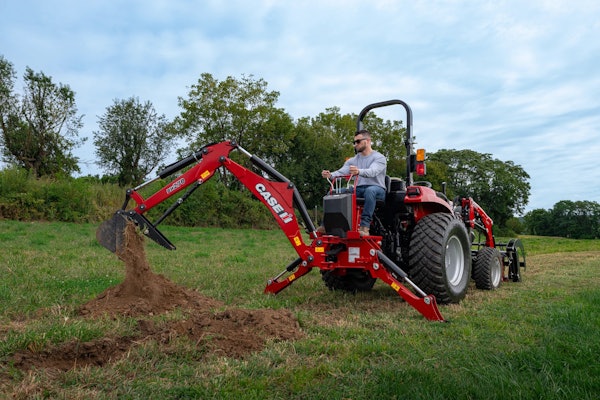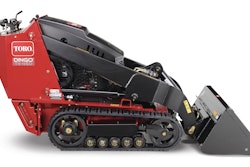 Photo: PERC
Photo: PERCFor landscape contractors, daily work goes hand-in-hand with caring for the environment. Along with creating and maintaining green spaces that add to the quality of life in communities, it’s common now to see contractors with organic maintenance services, designing landscapes around native flora and even collecting clippings for compost.
These services are growing in importance as more homeowners select contractors who offer sustainable services in an effort to make their homes and outdoor living spaces healthier.
There’s another way contractors can make their business profile greener: propane. More than 20,000 propane commercial mowers are in use this year across the United States, in part because the fuel offers a number of clean advantages to contractors.
1. Propane mowers reduce emissions
For contractors that want to make their service more environmentally friendly, commercial propane mowers improve emissions compared to a gasoline equivalent model.
Independent research commissioned by the Propane Education & Research Council shows that contractors can reduce greenhouse gas emissions (GHG) by 17 percent, nitrous oxide (NOx) emissions by 19 percent and sulfur oxide (SOx) emissions by 16 percent by switching to propane. Propane mowers also meet — and often exceed — emissions standards in communities with “ozone action days” that otherwise limit the use of equipment with internal combustion engines.
Plus, contractors likely don’t need to switch away from their mower brand of choice to enjoy the benefits of propane. Contractors considering propane mowers have a wider pool of options than even just six years ago, with 15 manufacturers producing more than 150 models, as well as four EPA- and CARB-certified aftermarket conversion kits.
2. Propane mowers are healthier for employees
Propane mowers’ reduced emissions can make a real impact on the health and wellness of the surrounding community, including the contractor’s employees.
Particularly during warmer months when landscape maintenance is at its peak, GHG, NOx and SOx contribute to ground-level ozone, which can contribute to breathing difficulties, eye irritation and can worsen pre-existing conditions such as asthma or chronic respiratory infections.
In fact, a 2011 study conducted by the U.S. Environmental Protection Agency found that the emissions produced by gasoline-fueled off-road equipment in the U.S., which includes mowers, leaf blowers, trimmers and brush cutters, amounted to approximately 26.7 million tons of pollutants, including chemicals that contribute to ground-level ozone.
Commercial propane mowers operate on a closed-loop fuel system, which virtually eliminates spills. Crews won’t be “wearing” the fuel home on their clothing, which is more common with other fuels like gasoline and diesel.
Contractors who have switched to propane have reported improved employee retention. Crews are likely to be happier knowing they work for a company that takes pride in sustainable practices, which also keeps workers healthy by limiting their own exposure to pollutants.
3. Propane mowers are cleaner for customers
The EPA recognized propane as a non-contaminant of the air, water and soil, too. In comparison, gasoline can contaminate soil and water tables, cause burns if left on the grass or ignite customer complaints about unsightly spills on concrete.
Gasoline exhaust is also listed by the World Health Organization as containing known carcinogens. These designations resonate not only with green-minded customers but also the regular homeowners concerned about the effects of fuel exhaust around young children and pets. Plus, homeowners are happy to learn fuel won’t be accidentally spilled on their lawn, driveways or sidewalks.
Additionally, commercial clients are increasingly seeking environmentally friendly services to support their own corporate sustainability efforts. It’s also more common to see bids from public agencies requiring some form of sustainable practice to qualify for jobs.
These can include large, multi-year contractors for services to school districts, cities, public universities, government facilities, rights-of-way and parks. With the lower total cost per hour of operation with propane mowers, it’s also possible that contractors can submit a lower bid than contractors operating with a gasoline mower fleet.
4. Switching to a green fuel can put money in your pocket
It’s well documented that propane mowers provide a lower total cost of operation over the life of the equipment compared to other fuels because of lower fuel costs, improved maintenance and an increase in daily productivity. Propane mowers offer a lower total cost of operation by 30 percent compared to gasoline and 50 percent compared to diesel over the life of a unit.
But going green doesn’t have to cost a lot upfront, either.
Contractors who do their homework can find that many organizations already offer financial assistance to make the switch to propane mowers. For example, the Propane Mower Incentive Program from PERC allows contractors to receive $1,000 for each new, dedicated propane mower or $500 for a certified propane conversion kit — about the price difference between a propane mower and a comparable gasoline unit. State and regional organizations, including local chapters of the Clean Cities Coalition or other local environmental groups, may also offer incentives.
Earth Day and the season of renewal is a great time to consider the impact a contractor’s business has on the local environment. Contractors ready to take the first step toward reducing emissions can visit propane.com to find out more about propane mowers and locate a propane equipment dealer nearby.
EDITOR’S NOTE: This article was written by Jeremy Wishart. Wishart is the director of off-road business development for the Propane Education & Research Council. He can be contacted at [email protected].









